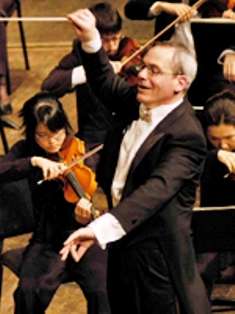|
Back
Original Don Carlos surfaces in Cincinnati Cincinnati
Corbett Auditorium
09/22/2013 -
Giuseppe Verdi: Don Carlos
Marco Panuccio, Marco Cammarota (Carlos), Helen Lyons, Nicole Spoltore, Summer Hassan (Elisabeth), Corey Crider, Jospeh Lattanzi (Rodrigue), Ken Shaw, Gustav Andreassen (Philippe), Leah deGruyl, Adria Caffaro, Stacey Rishoi (Eboli), Kevin Thompson (The Grand Inquisitor), Megan Slack (Thibault), Zachary Owen (Monk/Charles V), Pedro Arroyo (Lerme), Alec Carlson (Royal Herald), Jordan Stadvec (Heavenly Voice)
University of Cincinnati College-Conservatory of Music Chamber Choir, Earl Rivers (conductor), CCM Chorale, Brett Scott (conductor), University of Cincinnati Men's Chorus, Marie Bucoy-Calavan (conductor), UC Women's Chorus, Michael Fuchs (conductor), CCM Concert Orchestra, Annunziata Tomaro (music director), CCM Philharmonia Orchestra, Mark Gibson (conductor)
Omer Ben-Seadia (stage director)

M. Gibson (Courtesy of the CCM)
The University of Cincinnati College-Conservatory of Music offered a splendid tribute in honor of Giuseppe Verdi’s 200th birthday September 22 in Corbett Auditorium. Performed uncut was the 1867 Paris Opera version of Verdi’s Don Carlos in the original French. The project, an American premiere, enlisted the full forces of the Conservatory in a concert performance beginning in the afternoon and continuing in the evening, with a two-hour break for dinner. Complete in five acts, nothing was omitted, not even the ballet. It was an amazing accomplishment, coming so early in the school year and having been in preparation only since the start of classes in late August.
The one-time-only event – truly an historic one – came in kind of “under the radar,” as well, and 750-seat Corbett Auditorium was regrettably undersold, especially for part one.
Full credit for bringing it to fruition goes to conductor Mark Gibson, director of orchestral activities at CCM, who led with insight, conviction and what can only be called love. Principal roles were shared, with three singers as Elisabeth de Valois (wife of Philip II of Spain, originally betrothed to his son Carlos and in love with Carlos), three as Princess Eboli (Élisabeth’s lady-in-waiting, also in love with Carlos), two as Carlos (in love with Élisabeth) and two each as Phillipe (the King) and Rodrigue (confidant of the King and friend of Carlos). All were CCM students and alumni, with the exception of faculty artist Ken Shaw as Philippe and guest artist Kevin Thompson as the Grand Inquisitor. The school’s two orchestras alternated parts one and two, with four choruses participating in part one, two in part two (157 voices total).
Based on the play by Schiller, Don Carlos exists in four versions, comprising either four or five acts, and in French or Italian (as Don Carlo). Gibson made it a point to include every note Verdi wrote for the 1867 original. All was done with minimal staging (just entrances and exits, some from the rear of the auditorium), without costumes, except for a black cowl for the Monk/Charles V, and a few props (a knife, a jewel box). Given the excellence of the performance, it nevertheless yielded an absorbing five hours (counting pauses between acts).
The voices were uniformly outstanding. Soprano Lyons, who sang Élisabeth for most of the opera (with relief in two scenes by sopranos Nicole Spoltore and Summer Hassan), projected a sweet, pure tone, which soared easily above chorus and orchestra. Tenor Panuccio as Carlos had a ringing, emotive delivery, lending vulnerability to his role, while Cammarota projected a stalwart Carlos. Baritone Crider was on target vocally and dramatically as the heroic Rodrigue (relieved in one scene by baritone Joseph Lattanzi), as was Shaw as Philippe. Bass Andreasson drew the plum assignment, singing Philippe’s stricken aria “Elle ne m’aime pas” (“She never loved me”) in act IV and standing up to the Grand Inquisitor in their confrontation over Carlos’ fate.
Three fine mezzos sang Eboli. Leah deGruyl and Adria Caffaro were witchy and beguiling, but it was Stacey Rishoi who transfixed the crowd in her angry, remorseful “O don fatal” (“O fatal gift”) in act IV, cursing her beauty and her jealousy in betraying Elisabeth’s love for Carlos to the King.
The conflicts in the plot were well presented, making for some gripping scenes. As in act II, for instance, where Carlos (Panuccio) pleads his love anew for Elisabeth (Lyons) and she pushes him away (being not only Philippe’s wife but Carlos’ mother) and in the duo ending act II, where Rodrigue (Crider) pleads with Philippe (Shaw) to alleviate the suffering in Flanders and Philippe warns Rodrigue of the Grand Inquisitor.
Sparks flew in act III, where Rodrigue (Crider) rebukes Eboli (mezzo Leah deGruyl) for threatening to betray Élisabeth to Philippe, and in the auto da fe scene (finale to act III), where Carlos (Cammarota) draws his sword against his father, all capped by offstage harp and Heavenly Voice (soprano Jordan Stadvec) welcoming the martyrs to Heaven.
After the roiling emotions and touching death of Rodrigue (Crider) in act IV, the last act came as a final emendation, with its tender farewells by Elisabeth and Carlos (Lyons and Panuccio) and Verdi’s deus ex machina, by which the condemned Carlos, summoned by the ghost of his grandfather (bass Zachary Owen from the rear of the hall, announced by a blinding light), takes refuge in the tomb of Charles V.
Mary Ellyn Hutton
|